2023 | Artistic Director's Blog
LA Diary
Carlo Chatrian was Artistic Director of the Berlinale from June 2019 to March 2024. In his texts, he takes a personal approach to the festival, to outstanding filmmakers and the programme.
What follows is a series of travel notes. Not a journey like many others, but not an exceptional one either - if not for happening after the long pause the pandemic has caused, which brought some distance back to Europe and America. These are notes taken between an appointment and a car ride. They do not claim to tell the state of the art of the industry or to sociologically describe a city as fascinating as it is evasive, which smells like cinema even when the films seem absent.
4/23
It doesn't matter how many times you've landed in LAX. It doesn't matter if the customs control lanes are empty or filled with passengers. It doesn't matter if the luggage is on time or absent – as it is in my case. Once outside the terminal, among lost tourists in Hawaiian shirts, businessmen waiting for the limousine, shuttle workers eager to give times and places of destinations, one always feels a little unsuited, as if confronted with something exuberant. Los Angeles is a contrast between opposites: chaos and organisation, luxury and poverty, nature and urbanisation. On the freeway, accompanied by a playlist where I struggle to understand at what point one song ends and the next begins, I let myself be carried away by Dante's black Tesla. The open window lets in a warm breeze. It could be the opening scene of a film, which has yet to reveal its plot. I look at the billboards announcing new TV series. I inhale. And I savour the moment.
4/24

At the farmer's market
Sunday morning. While the city is still sleeping, I discover an island of vitality in a nearby farmers’ market. A perfect encounter with the West Coast, proud of its nature and organic culture. Vegetables, mushrooms, fruit, all carefully catalogued, are displayed next to street food stands. It's 10 am but it seems like the right time not only for churros, but also for an Eastern pancake.
In the afternoon I plan to visit the new Academy Museum. At the entrance, after the vaccination check, Bernardo, who takes care of the film programming at the museum, awaits me. With his guidance, I visit the spaces of permanent and temporary exhibitions. Pedro Almodóvar has selected sequences from his films and, with the help of large screens, put them into dialogue. Faces, colors, atmospheres create a pleasant symphony, like a room populated by familiar figures. Spike Lee, conversely, thought of giving the shape of a living room to his world, where cinema is completed with objects from other fields (basketball, fashion…). All dark, and gathered around a circular sofa, is the one created by Hildur Guðnadóttir. A sound-based environment where I would like to stay for a while. But there is the Studio Ghibli exhibition, created specifically for the Academy. At the entrance, a deep green arch introduces this parallel world made up of characters halfway between human and animal, between the vertical dimension of the history and the horizontal one of fairy tales. The route relies on the fantastic pastel colors that make Hayao Miyazaki an Impressionist painter. There is even a (fake) grassy expanse on which to lie down and admire the clouds that flow on a ceiling screen. After backgrounds, cells, drawings and maquettes of various sizes, Ghibli dismisses us with a stone statue guarding the exit. And we exit too, leaving the space of the historic building to enter the adjacent one, circular like a spaceship, designed by Renzo Piano. A perfectly round room with “Piano” red colors, and above it a magnificent terrace overlooking the Hollywood Hills. No news of the luggage yet, but dusk is so beautiful that it makes every other thought go away.
4/25
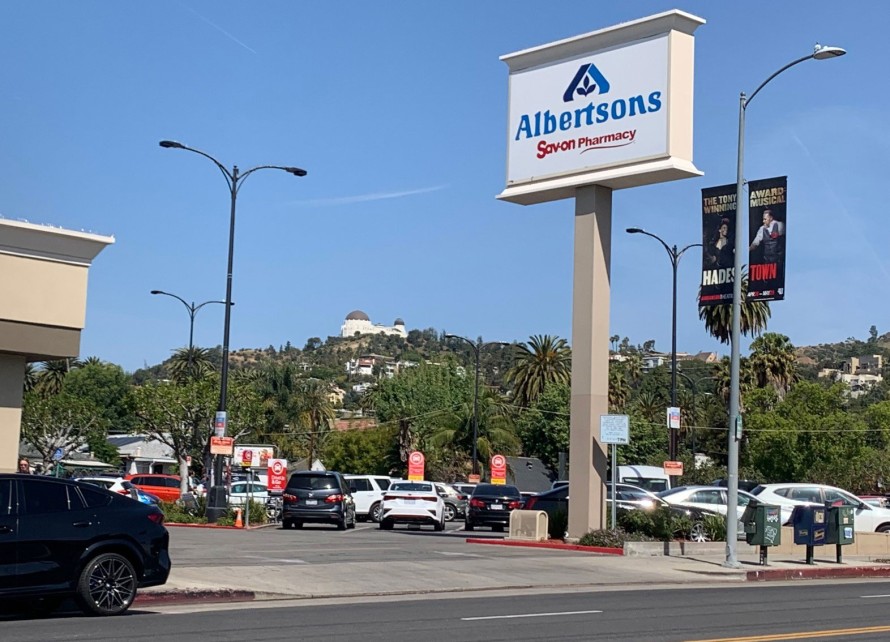
The view on the Griffith Observatory
The first appointment is in Los Feliz. Ryan and Sara await me, with the energy of youth but also with clear ideas concerning the choice of films to produce. We are in an outdoor café; the fresh air and the peaceful atmosphere of Los Feliz do the rest. I like this neighbourhood that seems to be under the protection of the Griffith Observatory. It is less exuberant than others. Less Porsche and more Toyota on the road. It is also a Toyota (Prius, just like in La La Land!) that brought me here. The driver is Sang who, like most Uber drivers, has been around for a few years. Uber is an easy gateway for anyone who has landed in LA. As with front-desk girls in production companies, it offers a salary to people who still feel in transition, even though they have been in the City of Angels for more than a decade. They all speak perfect English, but within the California machine they have retained a relationship with their culture of origin. So, I happen to hear the navigator speak Spanish, Chinese, Russian ...
At noon, I have an appointment with friends from United Talent Agency (UTA) at Maybourne Terrace. We are in the heart of Beverly Hills, or that part of Los Angeles that the collective imagination associates with the entire city. The luxury boutiques, the young people in tracksuits that cost as much as an evening dress, the Italian restaurants that flaunt simplicity ... Between Beverly Hills and nearby Century City - where I'll meet Roeg and his Creative Artists Agency (CAA) colleagues in the afternoon – you’ll find the main artist agencies. Explaining the role of these giants is not an easy task, given that over the years they have assumed different configurations. They act as matchmakers, producers, sellers. And above all, they are the ideal interlocutor to find out what is being manufactured, here and in the rest of the Western world.
The day ends with dinner with Kim and John, long-time programmers at Sundance. One of the things I like most is the direct exchange between programmers. Sometimes we discuss a title, more often we exchange opinions, and try to understand if the solutions we adopted can be shared. We exchange anecdotes. We laugh at the absurdities that are part of the life of a festival, especially when it gets very big. We are mutually reassured when things do not take the desired turn. And we share a dinner, happy to see each other again after a long period of isolation.
4/26
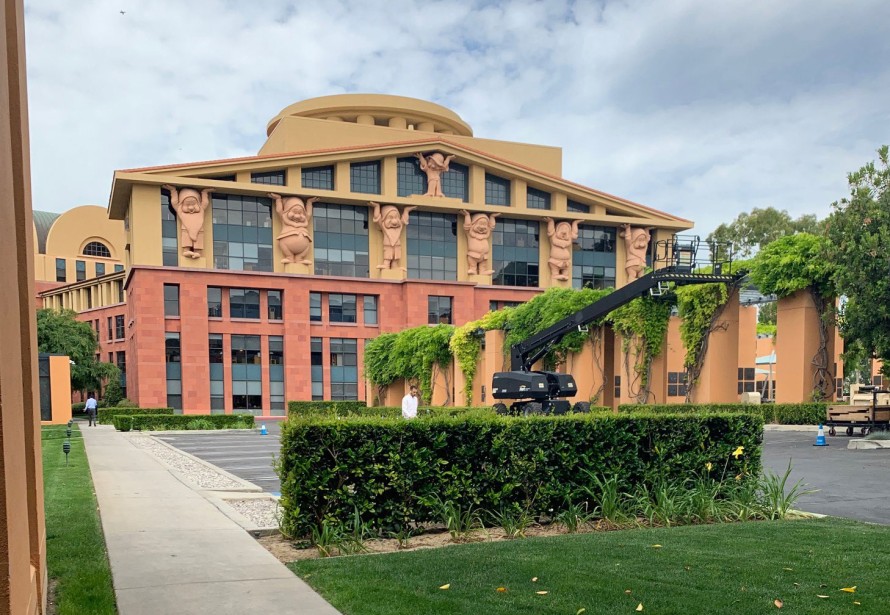
Walt Disney Studios, the Disney headquarters
I'm going to the Valley today. The first time I heard this name, I thought of a semi-wild context, where you can finally touch the exuberant nature of California. Instead, aside from the heat, the Valley has little or no exuberance. It is a broad valley behind the Hollywood Hills. In addition to being a very large residential center, some major studios are located here. They are real citadels. To enter Disney, you must have an invitation, print a pass, and show that you know where you want to go. Once you pass the gate, it feels like you are in a small village. Tree-lined avenues, sociable squirrels and the Disney-style building welcome you. I've been coming for ten years now, and little seems to have changed. Not so in terms of content. With the growing success of the film franchises, Disney+, the series, and the Searchlight films, Disney manages and produces an impressive slice of the collective imagination.
On the way back I travel with Evaristo, who comes from Uganda and who knows all the soccer players of Italy starting in the 1990s. He supports the Gunners, but now he's fed up with these mercenaries playing without having their hearts in it. He tells me one no longer enjoys watching matches. And then, as if to contradict himself: ”But, man, when you think that nothing can blow your heart anymore, a match like yesterday’s between Manchester City and Real happens (final result 4-3, then overturned by the equally exciting second leg match). And you find yourself inside again!”
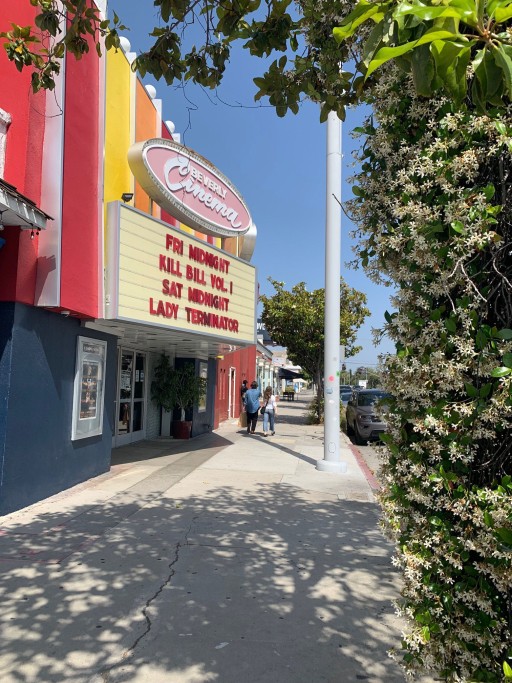
The New Beverly Cinema (owned and programmed by Quentin Tarantino)
In the evening, I'm on Sunset Boulevard for a dinner with Liz, at a restaurant that offers a spectacular view. The city begins to sparkle and reveals its huge expanse. After a stint at Disney, Liz is at Paramount. The next day she has to go to Vegas for CinemaCon, the annual convention where the films of the season are presented. Together we talk about the prospects of cinemas for the near future. The impression is that there is more optimism here. The idea of restarting is more evident - perhaps also because the noises of war, tens of thousands of kilometers away, aren’t as loud. In the week that Netflix took a huge blow to the stock market, the studios are flaunting optimism. The spring releases seem to be holding up, and the summer ones are just around the corner. Once I get into Oliver's Ford Fusion, caught in a wave of European fatalism, I say softly: “Let's hope autumn doesn't spoil this idyll.”
4/27
It is said that there is no other way to get to know Los Angeles than to travel through it in a car. The city incites wanderings, following the invitations of tree-lined avenues or the promises of villas of the most disparate styles: colonial, Victorian, Swiss chalet, or the more functional cubes of a Modernist style. For bureaucratic reasons, the pleasure of driving has been replaced by the safer Uber service, which allows you to get in touch with people with fascinating stories.
Among these, a special place is for O., a second-generation Frenchman, who came here to stay with friends. Thanks to a fake marriage, he got a Green Card. And he stayed. He’s happy to be able to speak his own language, and gets chatty: “Here there is a lot of money but few benefits.” He doesn't think about going back to live in France for now, but he wants to see his mother, who votes for LePen, because “WTF are all these foreigners doing in France?”. Without pointing out it sounds strange coming out of his mouth, I tell him that the people who arrive really don't have another choice; he agrees but says that it is not good. At one corner of the street, I struggle not to notice a series of tents, with hanging clothes and half-full shopping trolleys.
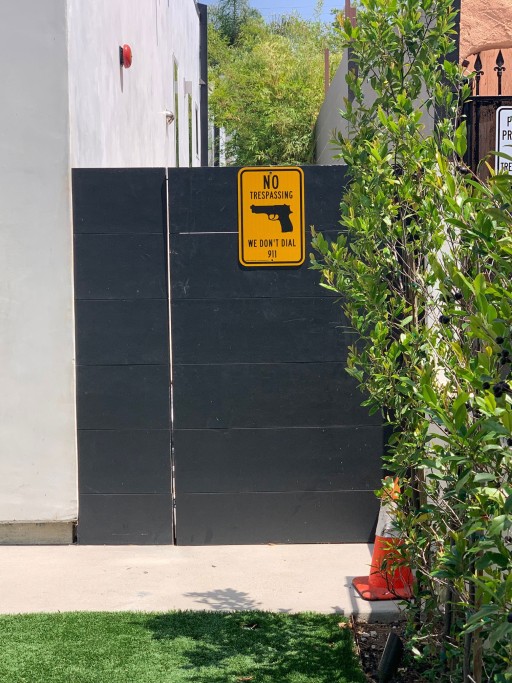
A clear hint in a protective neighbourhood
Today the meetings are more spaced out; so, between one and the other, I have time to take a walk - which is a risky endeavor in Los Angeles. Walking through the boulevards offers another approach to this city, designed as a series of islands. Like cars, homes also have an exterior and an interior that often do not convey the same image. The houses here are meant to be seen from a car. The front garden is cared for and defines the style of the house - and possibly that of the owners. When walking, however, you notice how every glimpse of the interior is carefully protected from the gaze of others. The concept of private property reaches unimaginable heights for a European perspective. This gap between the desire to show off and the absolute reserve in coming into contact speaks not only to Los Angeles society but also to American cinema. While in Europe the cinema has sneaked into people's homes in a brazen, unabashedly realistic way, in America “the home” is still, and perhaps always will be, the place of fiction. Even when the interior is filmed, it remains at the level of the front garden. No Trespassing.
4/28
For those who are forced to or have chosen to spend their day behind the wheel, the car becomes an extension of their personality. And music is often the first meeting point. The band America is still great. And Brent is visibly a champion of country music. Moses, on the other hand, is more eclectic and even allows me to listen to a little reggae. Mariko is more attuned to disco music. Her driving follows the rhythm of the beat of the moment.
Amazon Studios in Culver City is one of the emblems of the new in Hollywood. Alongside the low buildings Thomas Ince wanted more than a hundred years ago, an entire neighborhood has grown in just a few years. Entering requires a series of controls of increasing intensity. I think that without the escort of Lorenza, my host, I would not have made it. The conference room smells new: among people on-site and in video chats, I feel almost surrounded. But it is a pleasant sensation, a sign of interest and a progressive approach. Talks with studios, streamers and productions have never failed; a direct encounter, however, still makes all the difference in the world.
The day ends with a dinner organised by Laura. There are five of us on a patio. Along with delicious dishes (including a focaccia that I had the honour of testing), we share ideas about the cinema that has been and will be, about houses under reconstruction, about wish lists, about “analogue” vs automatic cars. The most talked about films are The Unbearable Weight Of Massive Talent and Everything Everywhere All At Once. Both comedies, both ironic and irreverent. And both, in spite of the titles, light like the air of this late spring in Los Angeles.
4/29
Today is Friday. I don't know why, but since I've been coming to Los Angeles, I've always been to Universal on a Friday. There must be a pattern that hides a motivation. Be that as it may, the path is stored here and I could do it without the guidance of Mandy, who has been at Universal for a few months after studying Business and Communications in Kansas City. Here too the meeting entails a significant deployment of people. Perhaps also due to the presence of M. Night Shyamalan at the festival, the meeting has a very cordial, almost warm tone. I tell myself that, despite the pandemic, we managed to convey a welcoming good feeling to our jury president. And maybe the films - the award-winning ones but also the ones that weren't - really surprised him, as he told me.
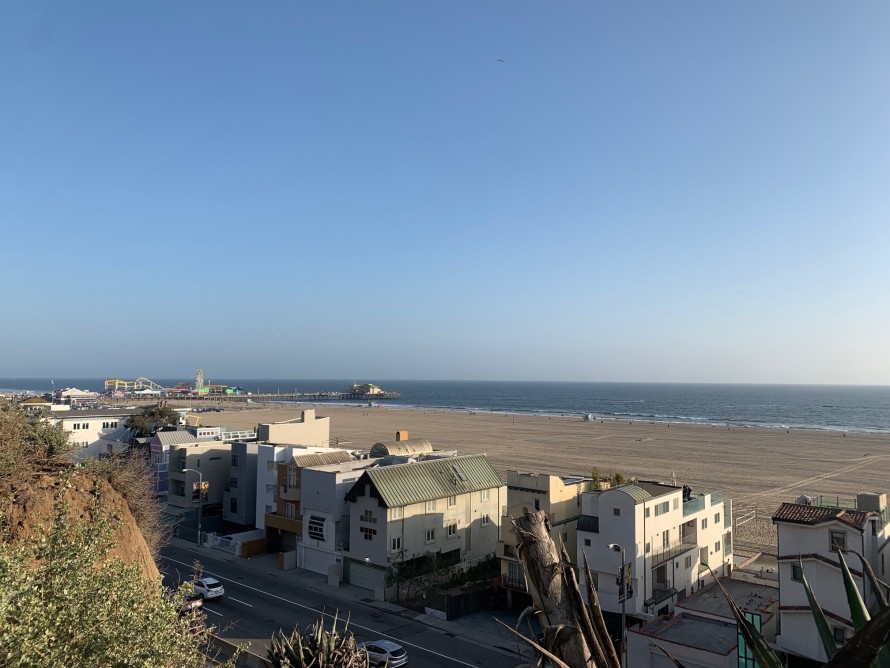
The Santa Monica beach with its pier
On the way back Mikhail immediately asks me: “Where do you come from with that accent?” I answer with a little hesitation, Italy (because my accent comes from there). And he sighs ... Italy induces sighs: because the word still reeks of beaches and food. But when I say that I work in Berlin, a sense of respect comes out. He is Ukrainian. He left the country several years ago. He says: “Luckily, we were able to come with the whole family. But I don’t understand what's going on with us…” I feel that he doesn't want to talk about his country. I stop my thoughts. I remain with this 60-year-old engineer who came here to work on a limousine project and got caught up in the crisis of the new millennium. And now, in any case, it is peaceful to be in this city-non-city, where you can provide for your family not only by designing cars but also by driving them.
The day and the stay end with a “trip to Santa Monica“. The driver is Shambel who knows alternative routes well, so we don't get even a minute of traffic. And, although we are in the right direction, it is the first time this has ever happened to me. So, before dinner with Ted and Vanessa, I have time to say goodbye to the ocean and the pier. And see flocks of squirrels grazing on the properly cut lawn.
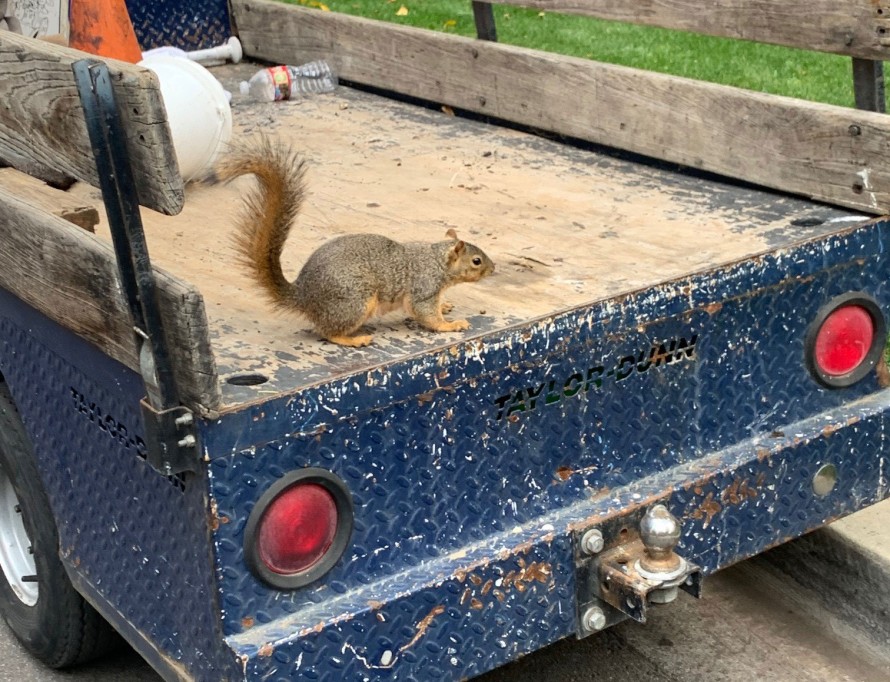
One of the bold and omnipresent squirrels
4/30
Here I am again towards the airport. Back in Tesla - in Los Angeles it's pretty much like a VW, the people's new car. Having come from Brooklyn on an advance to see how it is in this “spread-out city”, Marcues asks me about the Italian rap scene. He says: “Just this morning I was watching videos of Italian rappers and I was amazed. The way they dress, the way they move, they have no reason to envy the Americans.” By flaunting a knowledge that I do not have and fishing out what my children listen to, I try to support the discourse and bring it to the level of the relationship between music and politics. But Marcues doesn't take the bait. So, we talk about cultural expressions and characteristics related to places. Of rules and a life that always imposes new rules. Marcues loves Los Angeles mainly for the surrounding nature. He is the first driver who talks to me about nature. His mother came to Brooklyn from Haiti and passed on the language to her four children as well as a deep sense of duty. “Now I am happy to think and speak in Creole. It's my thing that helps me when I feel lost in this city.” I ask him if he has been to Haiti. The eyes framed in the rearview mirror light up. “Sure, it was the best trip I've ever done. I didn't visit museums or cities, but being in the countryside, living next to my relatives who cultivate the land, made me feel really good.” After all, it's just like he says: it doesn't take much to enjoy life. Despite the uncertainties and concerns that haunt us, one just tries to get the best, for what little it offers is always extraordinary ... And in Los Angeles, this little is always much more than the norm
Carlo Chatrian